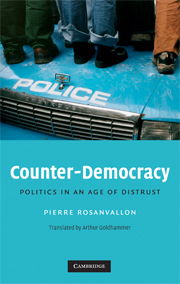Book contents
- Frontmatter
- Contents
- Foreword
- Introduction
- Part 1 Overseeing democracy
- 1 Vigilance, denunciation, evaluation
- 2 The overseers
- 3 The thread of history
- 4 Legitimacy conflicts
- Part 2 The sovereignty of prevention
- Part 3 The people as judge
- Part 4 Unpolitical democracy
- 14 Conclusion: the modern mixed regime
- Index
- References
1 - Vigilance, denunciation, evaluation
Published online by Cambridge University Press: 24 May 2010
- Frontmatter
- Contents
- Foreword
- Introduction
- Part 1 Overseeing democracy
- 1 Vigilance, denunciation, evaluation
- 2 The overseers
- 3 The thread of history
- 4 Legitimacy conflicts
- Part 2 The sovereignty of prevention
- Part 3 The people as judge
- Part 4 Unpolitical democracy
- 14 Conclusion: the modern mixed regime
- Index
- References
Summary
Vigilance
To be watchful, alert, and on guard are essential attributes of citizenship – attributes present from the beginning, since the ancient ideal of citizenship would have been unimaginable if reduced to mere periodic participation in elections. Vigilance first of all means monitoring: permanent close scrutiny of the actions of government. “A free people,” wrote Anacharsis Cloots during the French Revolution, “is an argus. It sees everything, hears everything, is everywhere, and never sleeps.” Vigilance compensates for the arrhythmia of the ballot box. The people are always at the ready, and the “dormant people” imagined by Locke and Rousseau become a giant ready to pounce. Vigilance in this sense means presence, attentiveness. The political language of the 1960s and 70s favored the term “mobilization”: a militant group was “mobilized” if it was prepared to play its role effectively. Mobilization was not so much a precondition of action as a way of describing a type of presence in the world, a kind of attentiveness to public affairs. Such a disposition is not merely a property of the agent who exhibits it: it enters into the construction of a global property of the public sphere.
Vigilance should also be seen as a mode of action. Though it “produces” nothing by itself, it cannot be dismissed as mere passivity. It defines a particular form of political intervention that involves neither decision-making nor exercise of the will. It rather creates possibilities and sets limits by imposing structure on a general field of action.
- Type
- Chapter
- Information
- Counter-DemocracyPolitics in an Age of Distrust, pp. 33 - 56Publisher: Cambridge University PressPrint publication year: 2008



